Jan. 6 committee Hearings, Wikipedia, USA TODAY, and PBS NewsHour
Jan. 6 committee Hearings, Wikipedia
In the aftermath of the January 6 United States Capitol attack, the proposal to form a bicameral commission failed due to a filibuster from Republicans in the Senate.[13] In late May, when it had become apparent that the filibuster would not be overcome, House Speaker Nancy Pelosi indicated that she would appoint a select committee to investigate the events as a fallback option.[14][15][16][17]
On June 30, 2021, the resolution, H.Res.503 – Establishing the Select Committee to Investigate the January 6th Attack on the United States Capitol,[18] passed on the House floor by a vote of 222 to 190, with all Democratic members and two Republican members, Adam Kinzinger and Liz Cheney, voting in favor.[19] Sixteen Republican members did not vote.[20] The resolution empowered Pelosi to appoint eight members to the committee, and House Minority Leader Kevin McCarthy could appoint five members “in consultation” with the Speaker.[21] Pelosi indicated that she would name a Republican as one of her eight appointees.[22]
On July 1, Pelosi appointed eight members, seven Democrats and one Republican, Liz Cheney (R-WY); Bennie Thompson (D-MS) would serve as committee chair.[23] On July 19, McCarthy announced the five members he would recommend as the minority on the select committee. He recommended that Jim Banks (R-IN) serve as Ranking Member, and minority members be Jim Jordan (R-OH), Rodney Davis (R-IL), Kelly Armstrong (R-ND), and Troy Nehls (R-TX).[24] Banks, Jordan, and Nehls voted to overturn the Electoral College results in Arizona and Pennsylvania. Banks and Jordan had also signed onto the Supreme Court case Texas v. Pennsylvania to invalidate the ballots of voters in four states.[25]
On July 21, Thompson stated in an interview that he would investigate Trump as part of the inquiry into Capitol attack.[26] Hours later, Pelosi said in a statement that she had informed McCarthy that she would reject the recommendations of Jordan and Banks, citing concerns for the investigation’s integrity and relevant actions and statements made by the two members. She approved the recommendations of the other three.[27] McCarthy then pulled all of his picks for the committee and stated that he would not appoint anyone on the committee unless all five of his choices were approved.[28][29]
After McCarthy rescinded his recommendations, Pelosi announced on July 25 that she had appointed Adam Kinzinger (R-IL) to the committee.[30][31] Kinzinger was one of the ten House Republicans who voted for Trump’s second impeachment.[32] Pelosi also hired a Republican, former Rep. Denver Riggleman (R-VA), as an outside committee staffer or advisor.[33] Cheney voiced her support and pushed for both of their involvement.[32]
On February 4, 2022, the Republican National Committee voted to censure Cheney and Kinzinger, which it had never before done to any sitting congressional Republican. The resolution formally drops “all support of them as members of the Republican Party”, arguing that they are, through their work on the January 6 House Committee, hurting Republican prospects in the midterm elections.[7][34] Kinzinger had already announced on October 29, 2021, that he would not run for reelection.[35] Cheney lost the primary for her reelection on August 16, 2022.[36]
Members 117th United States Congress
The commitee’s chair is Bennie Thompson, and the vice chair is Liz Cheney. Seven Democrats sit on the committee, while only two Republicans sit on the committee.
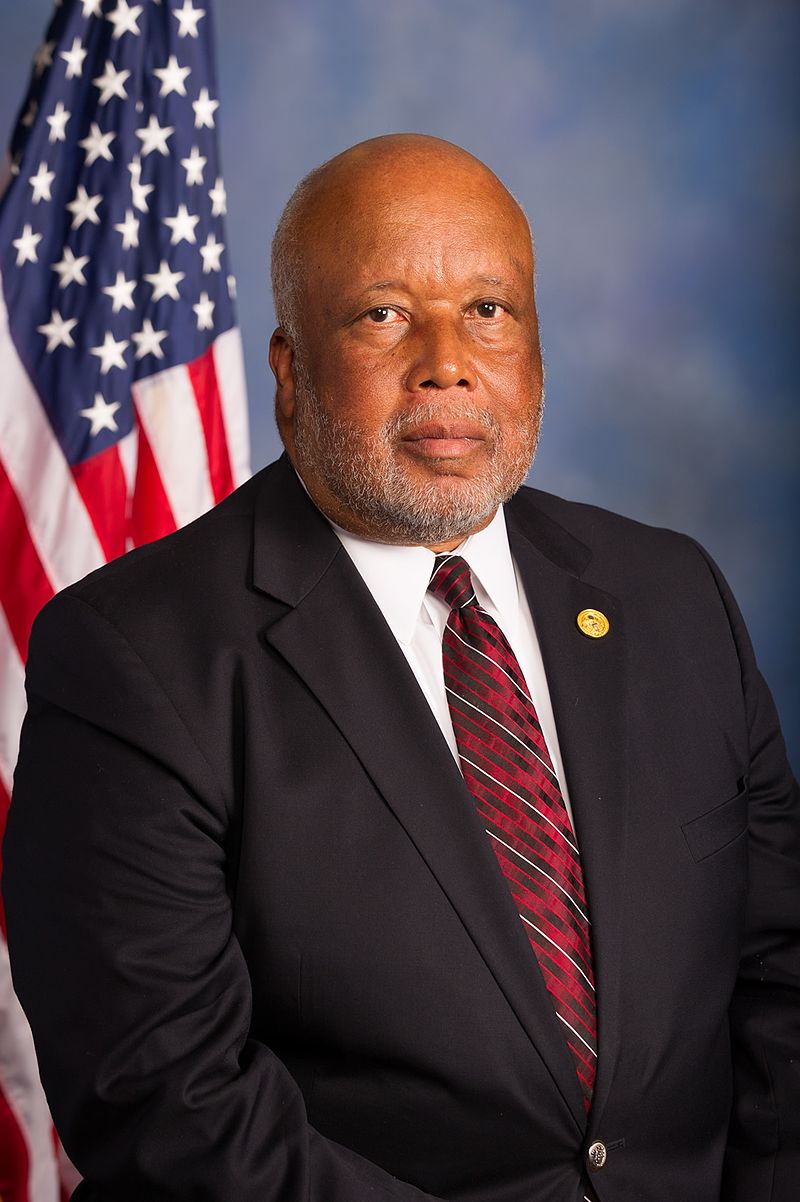 Chair Bennie Thompson
Chair Bennie Thompson
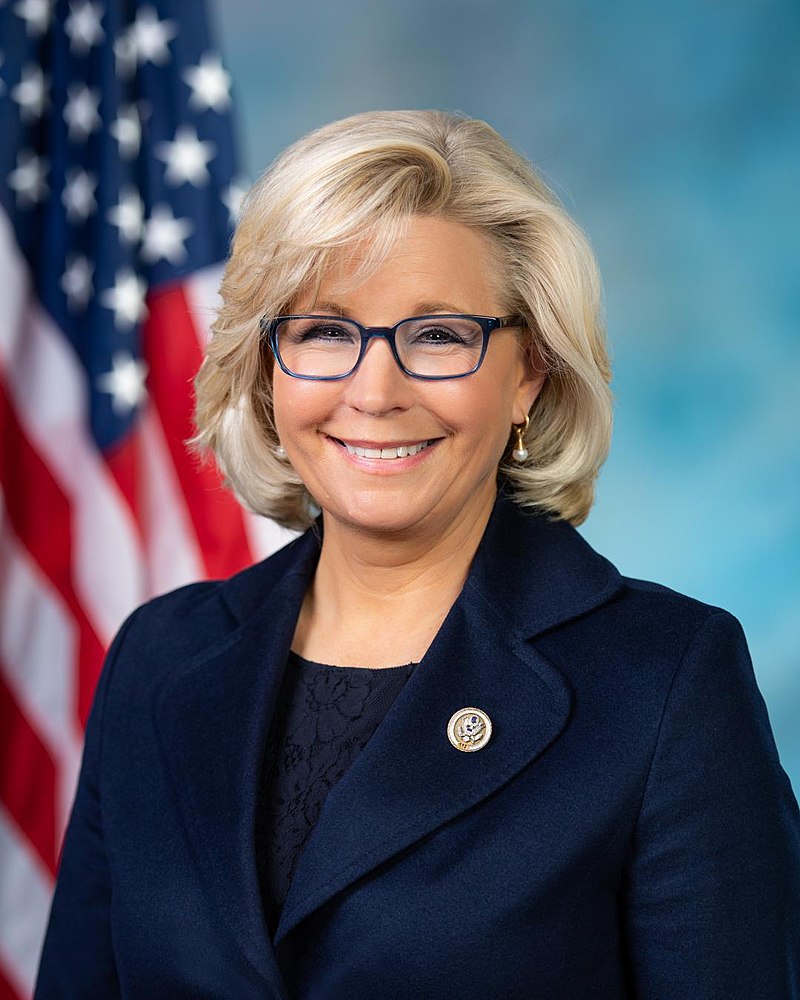 Vice Chair Liz Cheney
Vice Chair Liz Cheney
| Majority | Minority |
| · Bennie Thompson, Chair, Mississippi[37]
· Zoe Lofgren, California[38] · Adam Schiff, California[39] · Pete Aguilar, California[40] · Stephanie Murphy, Florida[41] · Jamie Raskin, Maryland[42] · Elaine Luria, Virginia[43] |
· Liz Cheney, Vice Chair, Wyoming[44]
· Adam Kinzinger, Illinois[45] |
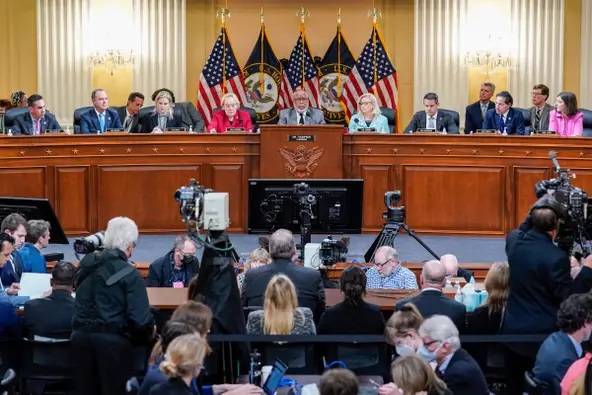 From left, Rep. Pete Aguilar, D-Calif., Rep. Adam Schiff, D-Calif., Rep. Zoe Lofgren, D-Calif., Chairman Bennie Thompson, D-Miss., Vice Chair Liz Cheney, R-Wyo., Rep. Adam Kinzinger, R-Ill., Rep. Jamie Raskin, D-Md., and Rep. Elaine Luria, D-Va., sit on the dais as the House select committee investigating the Jan. 6 attack on the U.S. Capitol continues, Monday, June 13, 2022 on Capitol Hill in Washington.
From left, Rep. Pete Aguilar, D-Calif., Rep. Adam Schiff, D-Calif., Rep. Zoe Lofgren, D-Calif., Chairman Bennie Thompson, D-Miss., Vice Chair Liz Cheney, R-Wyo., Rep. Adam Kinzinger, R-Ill., Rep. Jamie Raskin, D-Md., and Rep. Elaine Luria, D-Va., sit on the dais as the House select committee investigating the Jan. 6 attack on the U.S. Capitol continues, Monday, June 13, 2022 on Capitol Hill in Washington.
POOL PHOTO BY JABIN BOTSFORD USA TODAY
In July 2021, Thompson announced the senior staff for the select committee. They included:[46]
David Buckley as staff director. Served as CIA inspector general, and House Permanent Select Committee on Intelligence minority staff director
Kristin Amerling as deputy staff director and chief counsel. Served as deputy general counsel at the Transportation Department and chief counsel of multiple congressional committees.
Hope Goins as counsel to the chairman. Served as top advisor to Thompson on homeland security and national security matters.
Candyce Phoenix as senior counsel and senior advisor. Serves as staff director of the House Oversight Subcommittee on Civil Rights and Civil Liberties.
Tim Mulvey as communications director. Served as communications director for the House Committee on Foreign Affairs.
Throughout August 2021, Thompson announced additional staffers for the select committee.[47][48] Those being:
Denver Riggleman, senior technical adviser for the January 6 Committee. He previously served as a Republican congressman from Virginia and was an ex-military intelligence officer.
Riggleman left the committee in April 2022.[49]
Joe Maher as principal deputy general counsel from the Department of Homeland Security
Timothy J. Heaphy was appointed as the committee’s chief investigative counsel.[50][51]
Investigation
The select committee’s work is ongoing. Its investigative teams each focus on a specific area like funding, individuals’ motivations, organizational coalitions, and how Trump may have pressured other politicians.[52] The investigation commenced with public hearings on July 27, 2021, when four police officers testified. As of the end of 2021, it had interviewed more than 300 witnesses and obtained more than 35,000 documents.[53] By May 2022, those totals had surpassed 1,000 witnesses and 125,000 records.[2] Some interviews were recorded.[54] As of the October 13th hearing, the select committee has conducted more than 1,000 depositions and interviews, reviewed hundreds of hours of videos (security camera footage, documentary footage, etc.) as well as hundreds of thousands of pages of documents collected throughout their investigation. .[55] While the investigation is still in progress, the select committee has been very cautious on what they publicly communicate on as it has only communicated some, but not all, of the information it has found.
The select committee has split their multi-pronged investigation into multiple color-coded teams.[56][57][58] The teams consist of:
Green Team, which is tasked with investigating the money trail and whether or not Trump and other Republican allies defrauded their supporters by spreading misinformation regarding the 2020 presidential election, despite knowing the claims were not true.
Gold Team, which is tasked with investigating whether members of Congress participated or assisted in Trump’s attempted to overturn the election. They are also looking into Trump’s pressure campaign on local and state officials as well as on executive departments, like the Department of Justice, Department of Homeland Security, Department of Defense, and others to try to keep himself in power.
Purple Team, which is tasked with investigating Domestic violent extremist groups, such as the QAnon movement and the militia groups, the Oath Keepers and the Proud Boys and their involvement with the attack.
Red Team, which is tasked with investigating the planners of the January 6th rally and other “Stop the Steal” organizers and if they knew the rally would intentionally become violent.
Blue Team, which is tasked with understanding the threats leading up to the attack, how intelligence was shared among law enforcement, and their preparations or lack thereof.[59] Additionally, Blue team has access to thousands of documents from more than a dozen agencies that other security reviews did not have.[60]
Ultimately, the select committee’s findings may be used to inform new legislation. For example, in October 2021, committee members were already collaborating to draft a bill that would clarify the procedures for certifying presidential elections.[61] Election certification is governed by the 1887 Electoral Count Act.
The select committee’s findings may also be used in arguments to hold individuals, notably Donald Trump,[2] legally accountable. Possible criminal charges for Trump are obstruction of the electoral certification proceedings, which could carry a maximum sentence of 20 years;[62] “dereliction of duty” in not stopping the riot,[63] especially given testimony from his inner circle who say he was repeatedly advised to stop it;[64] and seditious conspiracy.[65][66][67] Other Republicans could face charges of wire fraud for telling lies in their fundraising efforts.[68][69]
A conviction, in turn, may be used to bar individuals from running for office in the future, as insurrectionists are constitutionally ineligible to hold public office. It is, however, unclear who enforces that.[70][71] In January 2022, lawyers challenged Representative Madison Cawthorn‘s eligibility to run for reelection,[72][73] and, in March 2022, Representative Marjorie Taylor Greene‘s eligibility was similarly challenged.[74] The first elected official to be removed from office for participating in the Capitol attack was Couy Griffin, a county commissioner from New Mexico. A judge removed him from office on September 6, 2022, citing the 14th Amendment and ruling that Griffin had participated in an “insurrection”.[75]
The select committee’s work may also aid the state of Georgia if it decides to prosecute Trump for solicitation of election fraud. On May 2, 2022, Fulton County‘s District Attorney Fani Willis opened a special grand jury to consider criminal charges.[76]
Simultaneous investigations by the Justice Department
Main article: United States Justice Department investigation into attempts to overturn the 2020 presidential election
The DOJ is probing the months-long efforts to falsely declare that the election was rigged, including pressure on the DOJ, the fake-electors scheme, and the events of January 6 itself. Potential charges against Trump include seditious conspiracy and conspiracy to obstruct a government proceeding.[77]
It was long anticipated that the House select committee would formally recommend that the Justice Department bring criminal charges.[78] At this point, however, it may not. Congressional committees typically are supposed to stick to legislative goals.[79] Congress does sometimes recommend criminal charges, but their “recommendation” or “referral” has no legal force in itself,[80] and the Justice Department is already investigating anyway. On September 25, 2022, Representative Schiff said he favored a criminal referral and hoped the committee would be unanimous on this point.[81]
The select committee is sharing certain information with the Justice Department: for example, the committee’s suspicion of witness tampering in Trump’s placing of a phone call to a witness.[82]
However, the committee has not yet fulfilled the Justice Department’s request that it turn over all its interview transcripts. The Justice Department sent a letter on April 20, 2022, asking for transcripts of past and future interviews. Thompson, the committee chair, told reporters he did not intend to give the Justice Department “full access to our product” especially when “we haven’t completed our own work.” Instead, the select committee negotiated for a partial information exchange.[83] On June 15, the Justice Department repeated its request. They gave an example of a problem they had encountered: The trial of the five Proud Boys indicted for seditious conspiracy had been rescheduled for the end of 2022 because the prosecutors and the defendants’ counsel did not want to start the trial without the relevant interview transcripts.[84] On July 12, 2022, the committee announced it was negotiating with the Justice Department about the procedure for information-sharing and that the committee had “started producing information” related to the Justice Department’s request for transcripts. Representative Thompson told CNN that they would likely “establish a procedure to look at some of the material” later in July after the eighth public hearing.[85] In an interview with Nicole Wallace on Deadline: White House, Representative Lofgren stated that the public will get the report at the same time as the DOJ, though the DOJ may receive an unredacted version of the final report.[86]
Information received from Mark Meadows
Donald Trump and Mark Meadows in 2020
In September 2021, the select committee subpoenaed former White House chief of staff Mark Meadows. Meadows initially cooperated but ultimately did not provide a complete set of requested documents[87] and sued to block the two congressional subpoenas. (Meadows did comply with a different subpoena, also January 6-related, issued by the Justice Department in 2022.)[88] On December 14, 2021, the full House voted to hold Meadows in contempt of Congress,[89] but the Justice Department decided not to criminally charge him.[90] The Justice Department does, however, believe the House subpoena was justified and that Meadows has only “qualified” immunity given that Trump is no longer in office[91][92] (as it argued in a July 15, 2022 amicus brief[93] filed at the request of U.S. District Court Judge Carl J. Nichols, regarding Meadow’s claim of immunity from the congressional subpoena).[94] On October 31, 2022, the judge ruled that the congressional subpoenas were “protected legislative acts” that were “legitimately tied to Congress’s legislative functions’.”[95]
In late 2021, before Meadows stopped cooperating, he provided thousands of emails and text messages.[96][87] that revealed efforts to overturn the election results:
The day after the election, former Texas governor and former Secretary of Energy Rick Perry sent Meadows a proposed strategy for Republican-controlled state legislatures to choose electors and send them directly to the Supreme Court before their states had determined voting results.[97][98]
Fox News host Sean Hannity exchanged text messages with Meadows suggesting that Hannity was aware in advance of Trump’s plans for January 6. The committee wrote to Hannity asking him to voluntarily answer questions.[99][100]
Representative Jim Jordan asked Meadows if Vice President Mike Pence could identify “all the electoral votes that he believes are unconstitutional”.[101]
The day after the riot, one text stated that “We tried everything we could in our objections to the 6 states. I’m sorry nothing worked.”[102][101]
Meadows also participated in a call with a Freedom Caucus group including Rudy Giuliani, Representative Jim Jordan, and Representative Scott Perry during which they planned to encourage Trump supporters to march to the Capitol on January 6.[103]
Meadows also exchanged post-election text messages with Ginni Thomas, the wife of Supreme Court Justice Clarence Thomas, in which they expressed support of Trump’s claims of election fraud. On November 5, in the first of 29 text messages, Ginni Thomas sent to Meadows a link to a YouTube video about the election.[104] She emailed Arizona and Wisconsin lawmakers on November 9 to encourage them to choose different electors, exchanged emails with John Eastman, and attended the rally on January 6.[105][106][107]
Some of the communications revealed Trump allies who privately expressed disagreement with the events of January 6 while defending Trump in public:
Donald Trump Jr. pleaded with Meadows during the January 6 riot to convince his father that “it has gone too far and gotten out of hand.”[108]
Similarly, Fox News hosts Brian Kilmeade, Sean Hannity, and Laura Ingraham asked Meadows to persuade Trump to appear on TV and quell the riot.[109]
In mid-2022, CNN spoke to over a dozen people who had texted Meadows that day, and all of them said they believed that Trump should have tried to stop the attack.[110]
One of the most revealing documents provided by Meadows was Trump.[118][113] Politico reported in January 2022 that Bernard Kerik had testified to the committee that Waldron also originated the idea of a PowerPoint presentation[111][112] describing a strategy for overturning the election results. The presentation had been distributed by Phil Waldron, a retired Army colonel (now owning a bar in Texas)[113] who specialized in psychological operations and who later became a Trump campaign associate. A 36-page version appeared to have been created on January 5,[114][111] and Meadows received a version that day.[115][116][117] He eventually provided a 38-page version to the committee.[114] It recommended that Trump declare a national security emergency to delay the January 6 electoral certification, invalidate all ballots cast by machine, and order the military to seize and recount all paper ballots.[115][116] (Meadows claims he personally did not act on this plan.[115]) Waldron was associated with former Trump national security advisor Michael Flynn and other military-intelligence veterans who played key roles in spreading false information to allege the election had been stolen from a military seizure of voting machines, which was included in a draft executive order dated December 16.[119][120] The next month, Politico published emails between Waldron, Flynn, Kerik, Washington attorney Katherine Friess and Texas entrepreneur Russell Ramsland that included another draft executive order dated December 16. That draft was nearly identical to the draft Politico had previously released and embedded metadata indicated it had been created by One America News anchor Christina Bobb. An attorney, Bobb had also been present at the Willard Hotel command center.[121][122]
Obstacles
Release of documents from the National Archives and Records Administration (NARA)
One of the main challenges to the committee’s investigation was Trump’s use of legal tactics to try to block the release of the White House communication records held at the National Archives and Records Administration (NARA).[123] He succeeded in delaying the release of the documents for about five months. The committee received the documents on January 20, 2022.[124][125]
Some of the documents had been previously torn up by Trump and taped back together by NARA staff.[126] Trump is said to have routinely shredded and flushed records by his own hand, as well as to have asked staff to place them in burn bags, throughout his presidency.[127][128] Additionally, as the presidential diarist testified to the committee in March 2022, the Oval Office did not send the diarist detailed information about Trump’s daily activities on January 5 and 6, 2021.[129]
Trump’s phone records from the day of the attack, as provided by NARA to the committee, have a gap of seven-and-a-half hours that spans the time when the Capitol was being attacked. It is not that pages were removed from his call logs; rather, no calls during this period were ever logged,[129] suggesting he was using a “burner” cell phone during that time.[130] He is said to have routinely used burner phones during his presidency.[131] The committee had not subpoenaed his personal phone records as of July 2022.[132]
The committee began its request for the NARA records in August 2021.[133][134] Trump asserted executive privilege over the documents.[135] Current president Joe Biden rejected that claim,[136][137] as did a federal judge (who noted that Trump was no longer president),[138] the DC Circuit Court of Appeals,[139] and the U.S. Supreme Court.[140][141] While the request for NARA documents was being litigated, the committee agreed to a Biden administration request that they forgo obtaining certain documents from NARA relating to sensitive national security matters that had no bearing on events of January 6.[142]
Trump warning Republicans not to testify
Another difficulty is that Trump has told Republican leaders not to cooperate with the committee.[143][144][145][146] Messages intended to pressure witnesses may constitute witness tampering, punishable by up to 20 years in prison.[147] While hundreds of people have testified voluntarily,[148] the committee has also had to issue dozens of subpoenas[149] to legally compel certain uncooperative individuals to testify. Some people who were subpoenaed nevertheless refused to testify: Roger Stone and John Eastman pleaded their Fifth Amendment rights, while Steve Bannon and Mark Meadows were found in contempt of Congress. In December 2021, Michael Flynn sued to block a subpoena for his phone records and to delay his testimony, though a federal judge dismissed his suit within a day.[150]
Secret Service, DHS and Pentagon text messages deleted
Soon after the attack on the Capitol, the Secret Service assigned new phones.[151] In February 2021, the office of Department of Homeland Security Inspector General Joseph Cuffari, a Trump appointee, learned that text messages of Secret Service agents had been lost. He considered sending data specialists to attempt to retrieve the messages, but a decision was made against it.[152] In June 2021, DHS asked for text messages from 24 individuals—including the heads for Trump and Pence security, Robert Engel and Tim Giebels—and did not receive them. In October 2021, DHS considered publicizing the Secret Service’s delays.[153][154] On July 26, 2022, Chairman Thompson, in his capacity as Chair of the House Homeland Security Committee, and Carolyn Maloney, Chair of the House Oversight & Reforms Committee, jointly wrote to the Council of the Inspectors General on Integrity and Efficiency about Cuffari’s failure to report the lost text messages and asked CIGIE chair Allison Lerner to replace Cuffari with a new Inspector General who could investigate the matter.[155] Additionally, renewed calls to have President Biden dismiss Cuffari have started gaining traction, with Senator Dick Durbin, who chairs the Senate Judiciary Committee requesting Attorney General Garland to investigate the missing text messages. However, as of July 2022, it is unknown if President Biden will fire Cuffari as he made a campaign promise to never fire an inspector general during his tenure as POTUS.
On August 1, 2022, House Homeland Security Chairman Bennie Thompson reiterated calls for Cuffari to step down due to a “lack of transparency” that could be “jeopardizing the integrity” of crucial investigations regarding the missing Secret Service text messages.[156] That same day, an official inside the DHS inspector general’s office told Politico that Cuffari and his staff are “uniquely unqualified to lead an Inspector General’s office, and … The crucial oversight mission of the DHS OIG has been compromised.”[157] Congress also obtained a July 2021 e-mail, from deputy inspector general Thomas Kait, who told senior DHS officials there was no longer a need for any Secret Service phone records or text messages. Efforts to collect communications related to Jan. 6 were therefore shutdown by Kait just six weeks after the internal DHS investigation began. The Guardian wrote that “Taken together, the new revelations appear to show that the chief watchdog for the Secret Service and the DHS took deliberate steps to stop the retrieval of texts it knew were missing, and then sought to hide the fact that it had decided not to pursue that evidence.”[158]
On August 2, 2022, CNN reported that relevant text messages from January 6, 2021, were also deleted from the phones of Trump-appointed officials at the Pentagon, despite the fact that FOIA requests were filed days after the attack on the Capitol.[159][160] The Secret Service was later reported to have been aware of online threats against lawmakers before the attack on the Capitol, according to documents obtained by the House select committee.[161]
Trump funding legal defense of Republicans who might testify against him
Trump’s Save America PAC has paid hundreds of thousands of dollars to lawyers representing over a dozen witnesses called by the committee. It is not illegal to pay someone else’s legal fees, but it raises the question of why Trump would do so and what kind of influence he might have over those people’s testimony.[162] On September 1, 2022, Trump said on a right-wing radio show that he had recently met supporters in his office. He said he was “financially supporting” them, adding: “It’s a disgrace what they’ve done to them.”[163]
The American Conservative Union is providing legal defense funds for some people who resist the committee. The organization says it only assists people who do not cooperate with the committee and who oppose its mission, according to chairman Matt Schlapp.[164]
Republican National Committee (RNC) claiming committee is illegitimate
Though the Republican National Committee has long insisted that the committee is invalid and should not be allowed to investigate, a federal judge found on May 1, 2022, that the committee’s power is legitimate.[165]
Witness not appearing for public hearing
Bill Stepien, Donald Trump’s final campaign manager, cancelled his plans to testify for the second hearing, under subpoena, an hour before it started, due to his wife’s going into labor, resulting in a delay of 45 minutes while the Select Committee scrambled to rearrange its presentation, with Bill Stepien’s lawyer to read a statement for him.[166][167] Instead, they used clips of his deposition.[168]
Public findings
United States House Select Committee on the January 6 Attack public hearings
2021 public hearings
The House select committee began its investigation with a preliminary public hearing on July 27, 2021, called “The Law Enforcement Experience on January 6th”.[169][170] Capitol and District of Columbia police testified, describing their personal experiences on the day of the attack, and graphic video footage was shown.[171]
2022 public hearings
Part of this section is transcluded from Public hearings of the United States House Select Committee on the January 6 Attack. (edit | history)
In 2022, the Committee held live televised public hearings.[172] The New York Times presented a detailed summary of the eight hearings held in June and July.[173]
During the first hearing on June 9, 2022, the chair and vice-chair (Democrat Bennie Thompson and Republican Liz Cheney, respectively) said that President Donald Trump tried to stay in power even though he lost the 2020 presidential election. Thompson called it a “coup”.[174] Cheney said the hearings would present evidence showing that Trump used a seven-part plan, culminating in the January 6 attack on the Capitol. The committee has been calling live witnesses, most of whom are Republicans, and some are Trump loyalists.[175][176] They testified under oath. The committee is also making extensive use of video from a number of sources, including sworn deposition testimony obtained earlier. During this hearing, the committee shared footage of the attack, discussed involvement of the Proud Boys, and included testimony from a documentary filmmaker and a member of the Capitol Police.
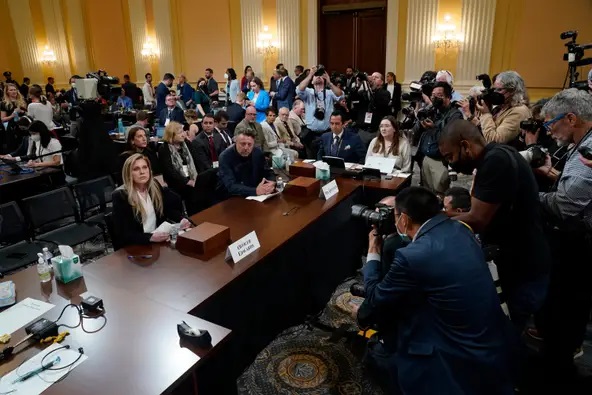 Officer Caroline Edwards and documentary filmmaker Nick Quested before testifying on June 9, 2022, during the opening of the committee hearing to investigate the attack on the Capitol.
Officer Caroline Edwards and documentary filmmaker Nick Quested before testifying on June 9, 2022, during the opening of the committee hearing to investigate the attack on the Capitol.
JACK GRUBER/USA TODAY
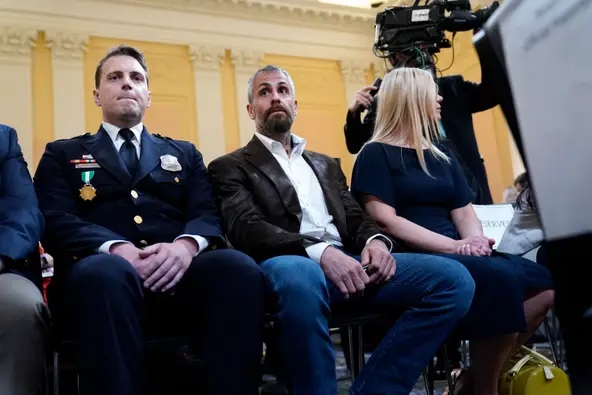 Washington Metropolitan Police Department officer Daniel Hodges, left, and former Washington Metropolitan Police Department officer Michael Fanone arrives as the House select committee investigating the Jan. 6 attack on the U.S. Capitol holds its first public hearing to reveal the findings of a year-long investigation, at the Capitol in Washington, Thursday, June 9, 2022.
Washington Metropolitan Police Department officer Daniel Hodges, left, and former Washington Metropolitan Police Department officer Michael Fanone arrives as the House select committee investigating the Jan. 6 attack on the U.S. Capitol holds its first public hearing to reveal the findings of a year-long investigation, at the Capitol in Washington, Thursday, June 9, 2022.
SCOTT APPLEWHITE, AP
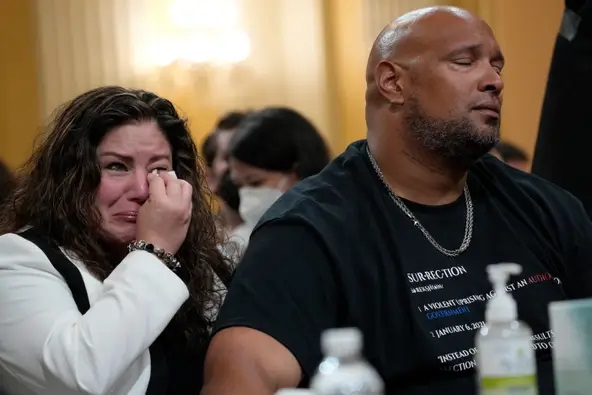 Sandra Garza, the long-time partner of Capitol Hill Police Officer Brian Sicknick who died shortly after the January 6 riot and U.S. Capitol Police Sgt. Harry Dunn (right) reacts as a video of rioters entering the Capitol plays during the opening of the select committee to investigate the January 6 attack on the United States Capitol.
Sandra Garza, the long-time partner of Capitol Hill Police Officer Brian Sicknick who died shortly after the January 6 riot and U.S. Capitol Police Sgt. Harry Dunn (right) reacts as a video of rioters entering the Capitol plays during the opening of the select committee to investigate the January 6 attack on the United States Capitol.
JACK GRUBER, USA TODAY
The second hearing on June 13, 2022, focused on evidence showing that Trump knew he lost and that most of his inner circle knew claims of fraud did not have merit. William Barr testified that Trump had “become detached from reality” because he continued to promote conspiracy theories and pushed the stolen election myth without “interest in what the actual facts were.” [177][178]
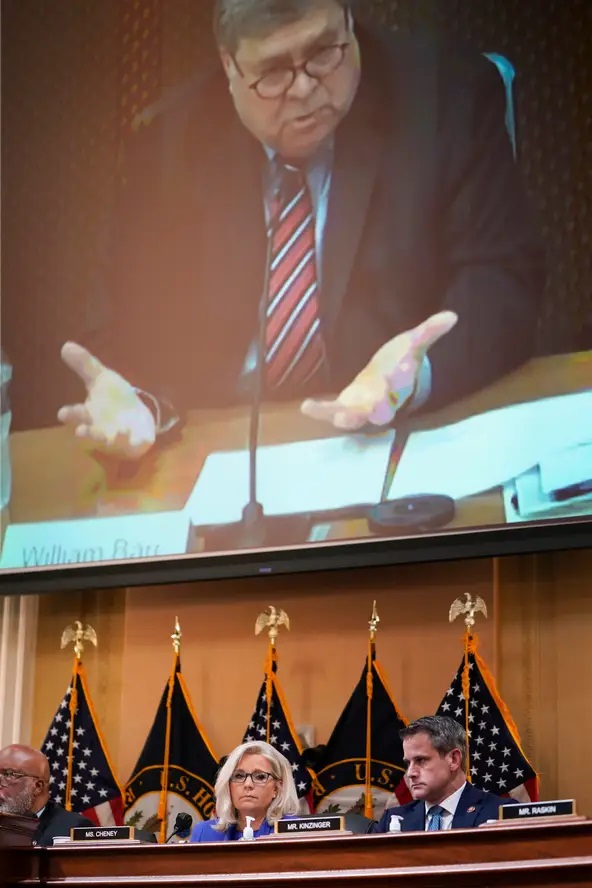 Former Attorney General Bill Barr says he made it clear to President Donald Trump that claims of election fraud weren’t true.
Former Attorney General Bill Barr says he made it clear to President Donald Trump that claims of election fraud weren’t true.
JACK GRUBER/USA TODAY
The third hearing on June 16, 2022, examined how Trump and others pressured Vice President Mike Pence to selectively discount electoral votes and overturn the election by unconstitutional means, using John Eastman‘s fringe legal theories as justification.[179]
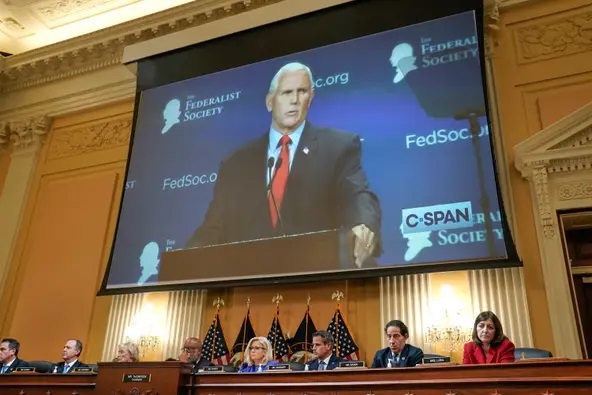 Former Vice President Mike Pence in a video during the opening public hearing of the Jan. 6 committee on June 9, 2022.
Former Vice President Mike Pence in a video during the opening public hearing of the Jan. 6 committee on June 9, 2022.
JACK GRUBER/USA TODAY
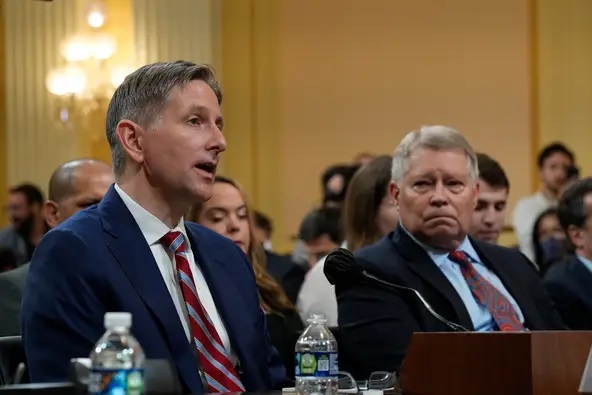 Greg Jacob (left), former counsel to Vice President Mike Pence testifies along with J. Michael Luttig, retired judge for the U.S. Court of Appeals for the Fourth Circuit and informal advisor to the Vice President during the House select committee to investigate the Jan.6th attack on the Capitol on June 16, 2022.
Greg Jacob (left), former counsel to Vice President Mike Pence testifies along with J. Michael Luttig, retired judge for the U.S. Court of Appeals for the Fourth Circuit and informal advisor to the Vice President during the House select committee to investigate the Jan.6th attack on the Capitol on June 16, 2022.
JARRAD HENDERSON, USA TODAY
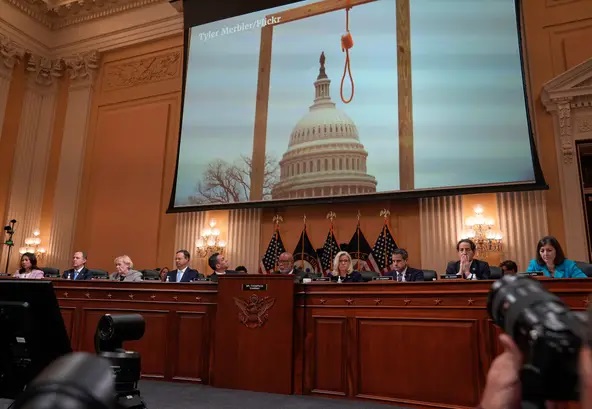 A video plays showing an image from Jan. 6, 2021 of a gallows in front of the U.S. Capitol on a large screen during the opening moments of the House select committee to investigate the Jan.6th attack on the Capitol on June 16, 2022.
A video plays showing an image from Jan. 6, 2021 of a gallows in front of the U.S. Capitol on a large screen during the opening moments of the House select committee to investigate the Jan.6th attack on the Capitol on June 16, 2022.
JARRAD HENDERSON, USA TODAY
The fourth hearing on June 21, 2022, included appearances by election officials from Arizona and Georgia who testified they were pressured to “find votes” for Trump and change results in their jurisdictions. The committee revealed attempts to organize fake slates of alternate electors and established that “Trump had a direct and personal role in this effort.”[180][181]
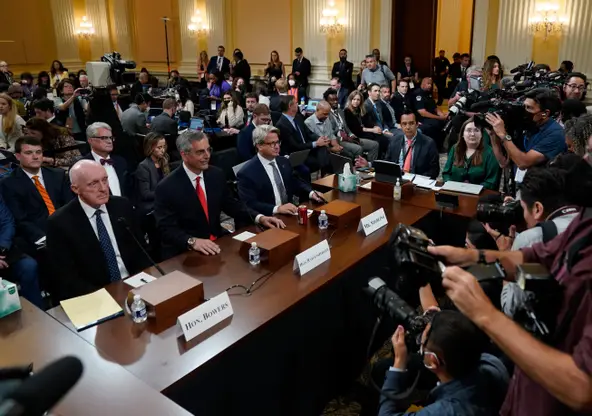 From left, Rusty Bowers, Brad Raffensperger and Gabriel Sterling testify on June 21, 2022, before the committee investigating the attack on the U.S. Capitol on Jan. 6, 2021.
From left, Rusty Bowers, Brad Raffensperger and Gabriel Sterling testify on June 21, 2022, before the committee investigating the attack on the U.S. Capitol on Jan. 6, 2021.
JACK GRUBER/USA TODAY
The fifth hearing on June 23, 2022, focused on Trump’s pressure campaign on the Justice Department to rubber stamp his narrative of a stolen election, the insistence on numerous debunked election fraud conspiracy theories, requests to seize voting machines, and Trump’s effort to install Jeffrey Clark as acting attorney general.[182]
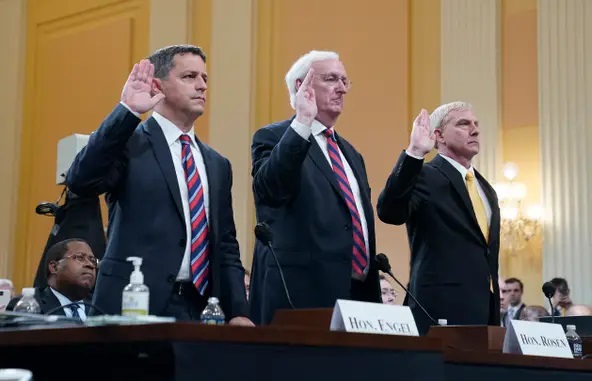 From left, Steven Engel, Jeffrey Rosen and Richard Donoghue are sworn in June 23, 2022, before testifying before the committee investigating the attack on the U.S. Capitol on Jan. 6, 2021.
From left, Steven Engel, Jeffrey Rosen and Richard Donoghue are sworn in June 23, 2022, before testifying before the committee investigating the attack on the U.S. Capitol on Jan. 6, 2021.
JACK GRUBER/USA TODAY
The exclusive witness of the sixth hearing on June 28, 2022, was Cassidy Hutchinson, top aide to former White House Chief of Staff Mark Meadows.[183] Conversations within Trump’s inner circle revealed White House officials knew, days in advance of January 6, that violence was possible. Her testimony showed Trump knew supporters at the Ellipse rally were armed with AR-15s and other weapons and that he wanted less stringent security checks at his speech. Trump planned to join the crowd at the Capitol and became irate when the Secret Service refused his request. Closing the hearing, Rep. Liz Cheney presented evidence that witness tampering may have occurred.[184]
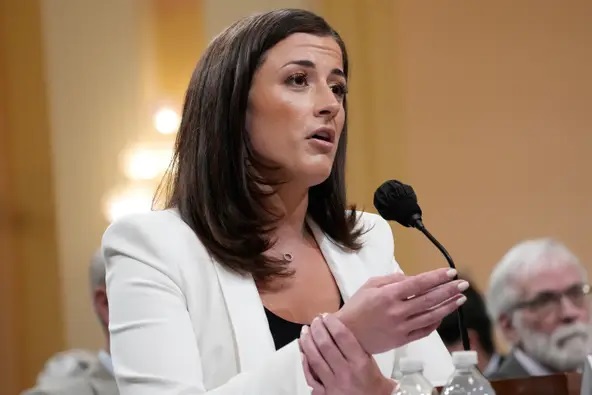 Cassidy Hutchinson, aide to former White House chief of staff Mark Meadows, testifies before the House Select Committee investigating the attack on the U.S. Capitol, Tuesday, June 28, 2022, at the Capitol in Washington. Part of her testimony included an account of Donald Trump allegedly ordering his Secret Service to take him to the Capitol on Jan. 6, trying to grab the steering wheel of his transport vehicle and being stopped by Secret Service agent Robert Engel.
Cassidy Hutchinson, aide to former White House chief of staff Mark Meadows, testifies before the House Select Committee investigating the attack on the U.S. Capitol, Tuesday, June 28, 2022, at the Capitol in Washington. Part of her testimony included an account of Donald Trump allegedly ordering his Secret Service to take him to the Capitol on Jan. 6, trying to grab the steering wheel of his transport vehicle and being stopped by Secret Service agent Robert Engel.
JACK GRUBER, USA TODAY
The seventh hearing on July 12, 2022, showed how Roger Stone and Michael Flynn connected Trump to domestic militias like the Oath Keepers and Proud Boys that helped coordinate the attack.[185][186][187]
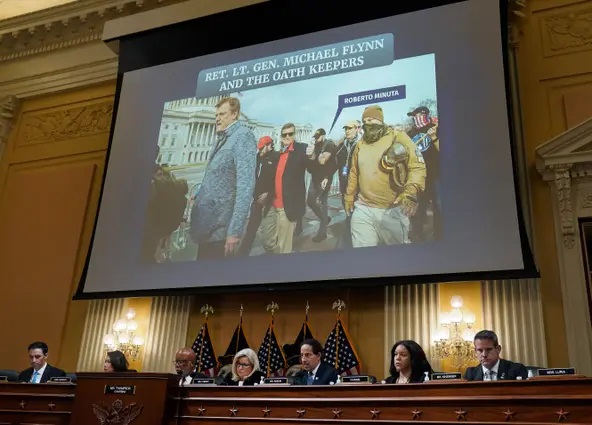 A photograph of former National Security Advisor to former President Donald Trump Michael Flynn with Oath Keepers is projected on a large screen during a public hearing of the House committee to investigate the January 6 attack on the U.S. Capitol.
A photograph of former National Security Advisor to former President Donald Trump Michael Flynn with Oath Keepers is projected on a large screen during a public hearing of the House committee to investigate the January 6 attack on the U.S. Capitol.
JACK GRUBER, USA TODAY
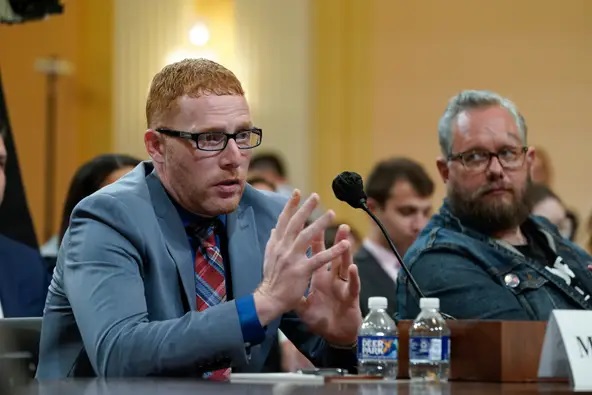 Stephen Ayres (right) testifies during a public hearing before the House committee to investigate the January 6 attack on the U.S. Capitol. Ayres was criminally charged for his actions during the Capitol insurrection. Right is Jason Van Tatenhove is a former spokesperson for the Oath Keepers.
Stephen Ayres (right) testifies during a public hearing before the House committee to investigate the January 6 attack on the U.S. Capitol. Ayres was criminally charged for his actions during the Capitol insurrection. Right is Jason Van Tatenhove is a former spokesperson for the Oath Keepers.
JACK GRUBER, USA TODAY
The eighth hearing on July 21, 2022, presented evidence and details of Trump’s refusal to call off the attack on the Capitol, despite several hours of repeated pleas from numerous officials and insiders. According to The New York Times, this final July hearing focused on evidence and witness testimony that highlighted two significant positions that the select committee wanted to communicate to the American people. First, Rep. Liz Cheney made the case that Trump should never hold office again, asking: “Can a president who is willing to make the choices Donald Trump made during the violence of Jan. 6 ever be trusted with any position of authority in our great nation again?” Secondly, there were urgent calls for legally-binding federal investigations into the actions of the former president and his associates: “If there is no accountability for Jan. 6, for every part of this scheme, I fear that we will not overcome the ongoing threat to our democracy,” Rep. Bennie Thompson said. “There must be stiff consequences for those responsible.”[173]
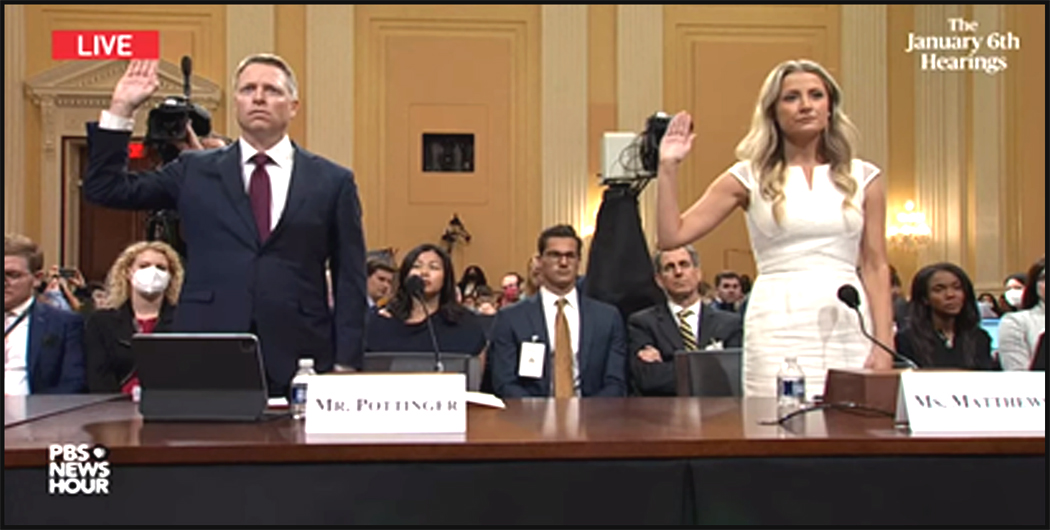 Matthew Pottinger and Sarah Matthews are sworn in July 21, 2022, before testifying before the committee investigating the attack on the U.S. Capitol on Jan. 6, 2021.
Matthew Pottinger and Sarah Matthews are sworn in July 21, 2022, before testifying before the committee investigating the attack on the U.S. Capitol on Jan. 6, 2021.
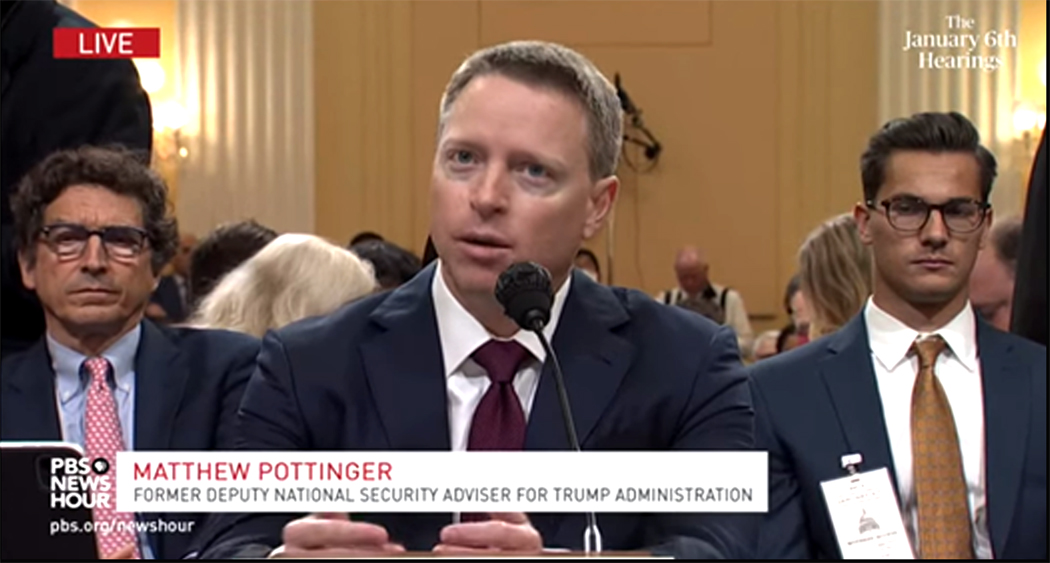 Matthew Pottinger Former Deputy National Security Adviser for Trump Administration
Matthew Pottinger Former Deputy National Security Adviser for Trump Administration
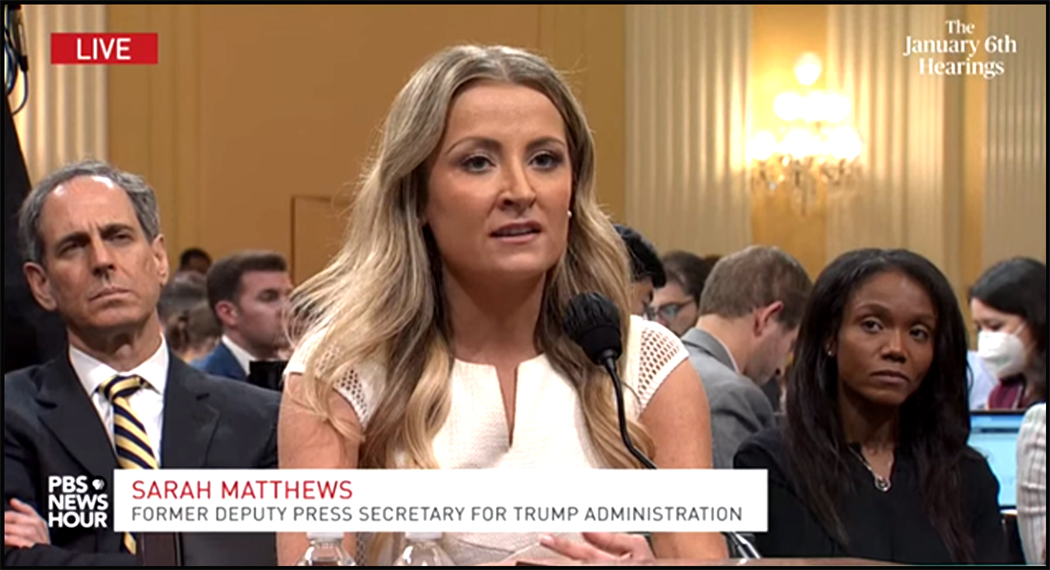 Sarah Matthews Former Deputy Press Secretary for Trump Administration
Sarah Matthews Former Deputy Press Secretary for Trump Administration
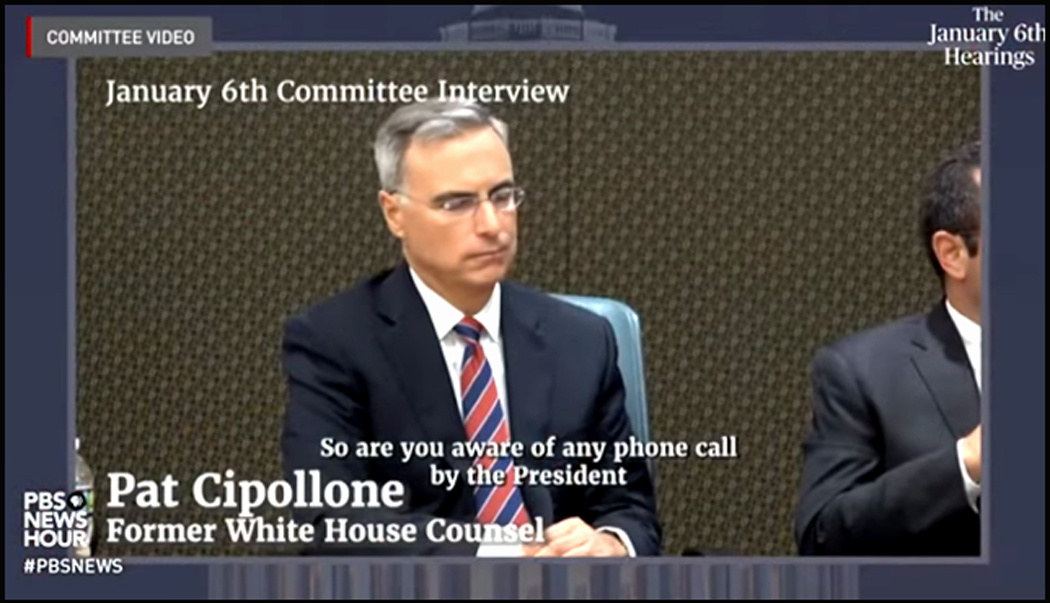 Pat Cipollone Former White House Counsel
Pat Cipollone Former White House Counsel
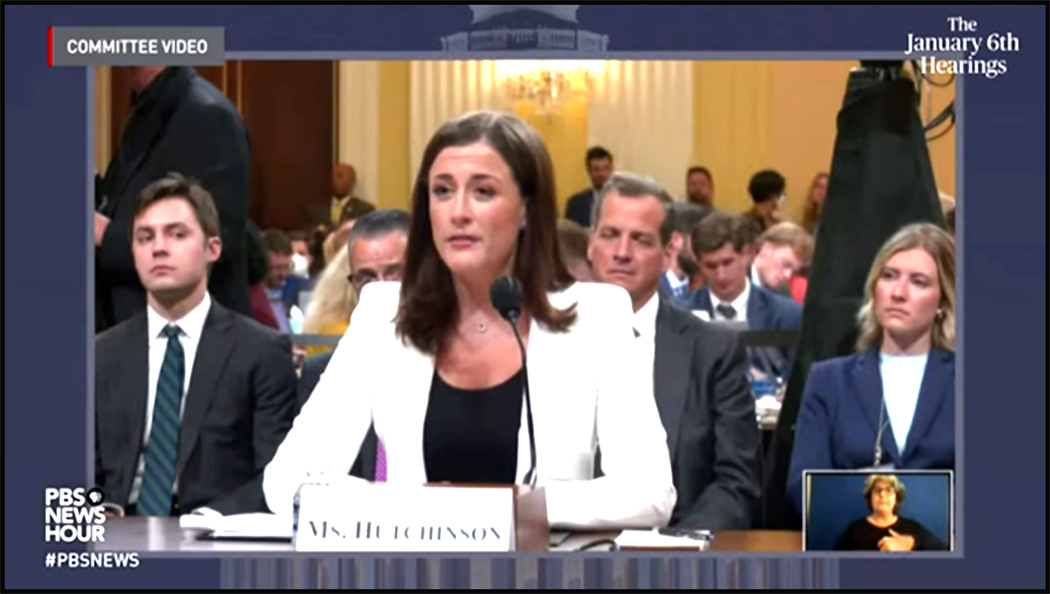 Cassidy Hutchinson, aide to former White House chief of staff Mark Meadows, testifies before the House Select Committee investigating the attack on the U.S. Capitol
Cassidy Hutchinson, aide to former White House chief of staff Mark Meadows, testifies before the House Select Committee investigating the attack on the U.S. Capitol
The ninth hearing on October 13, 2022,[188][189] may be the final hearing, though vice-chair Cheney wants more hearings.[188][189][190][191] The hearing presented video of Roger Stone and evidence that some Trump associates planned to claim victory in the 2020 election regardless of the official results.[192][193] The committee voted unanimously to subpoena Trump for documents and testimony[190][191]
 House Speaker Rep. Nancy Pelosi, (R), Ca., appears in video footage during the Oct. 13, 2022 hearing of the committee to investigate the January 6 attack on the United States Capitol in Washington DC.
House Speaker Rep. Nancy Pelosi, (R), Ca., appears in video footage during the Oct. 13, 2022 hearing of the committee to investigate the January 6 attack on the United States Capitol in Washington DC.
JACK GRUBER, USA TODAY
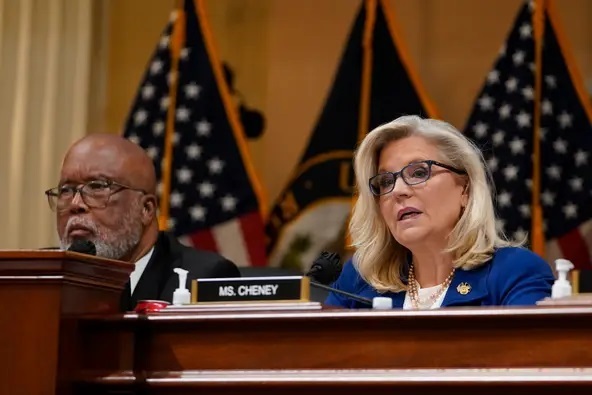 Rep. Liz Cheney, R-Wyo, makes a motion to subpoena former President Trump during the Oct. 13, 2022 hearing of the committee to investigate the January 6 attack on the United States Capitol in Washington DC.
Rep. Liz Cheney, R-Wyo, makes a motion to subpoena former President Trump during the Oct. 13, 2022 hearing of the committee to investigate the January 6 attack on the United States Capitol in Washington DC.
JACK GRUBER, USA TODAY
Final report
The committee may release an interim report.[194] The committee is expected to hire a writer to help produce its final report, which will be presented in a multimedia format.[195][194] Though it had been expected to release a report before the midterm elections,[196] as of September the committee was looking at “the end of the year” (before the 117th Congress ends).[197][49]
For more information, please visit the following links:
January 6 United States Capitol attack
Wikipedia
On January 6, 2021, following then–U.S. President Donald Trump’s defeat in the 2020 presidential election, a mob of his supporters attacked the Capitol Building in Washington, D.C.
WATCH LIVE: Jan. 6 Committee hearings – Day 9 – 4:25:53
PBS NewsHour 883,270 views Streamed live on Oct 13, 2022
WARNING: This video may include graphic or disturbing depictions of violence. The House committee investigating the Jan. 6 attack on the Capitol has announced another public hearing. It will be the first public committee event since July, when the last hearing concluded for a summer break. Since then, the committee has continued to compile witness testimony and evidence, according to committee chair Rep. Bennie Thompson, D-Miss. The hearing was originally scheduled for Sept. 28, but was postponed as Hurricane Ian approached landfall in Florida. The committee is now slated to gavel in Oct. 13 at 1:00pm EDT. Join the PBS NewsHour’s digital coverage beginning at 11:30 a.m. EDT with a look back at key moments from the eight public hearings held over the summer and a look ahead to the next. The last committee hearing in July focused on President Donald Trump’s actions on Jan. 6, 2021, as hundreds of his supporters broke into the U.S. Capitol. The hearing guided viewers minute-by-minute through the deadly afternoon, from the end of Trump’s speech encouraging supporters to march to the Capitol to a video he released late that afternoon telling the rioters they were “very special” but they had to go home. Stream your PBS favorites with the PBS app: https://to.pbs.org/2Jb8twG Find more from PBS NewsHour at https://www.pbs.org/newshour Subscribe to our YouTube channel: https://bit.ly/2HfsCD6 Follow us: TikTok: https://www.tiktok.com/@pbsnews Twitter: http://www.twitter.com/newshour Instagram: http://www.instagram.com/newshour Facebook: http://www.pbs.org/newshour Subscribe: PBS NewsHour podcasts: https://www.pbs.org/newshour/podcasts Newsletters: https://www.pbs.org/newshour/subscribe
https://www.youtube.com/watch?v=48HH4LVn07g&t=2s
WATCH LIVE: Jan. 6 Committee hearings – Day 8 – 2:56:39
PBS NewsHour 1,280,464 views Streamed live on Jul 21, 2022
WARNING: This video may include strong and disturbing language and images. The House committee investigating the Jan. 6 attack will hold its eighth public hearing July 21. The hearing is expected to focus on what then-President Donald Trump was doing during the three plus hours that his supporters were attacking the U.S. Capitol in an effort to stop the certification Joe Biden’s presidential victory on Jan. 6, 2021. The hearing is scheduled to begin at 8 p.m. ET. To preview the hearing, beginning at 7 p.m. ET, the PBS NewsHour will take a look back at the last seven public hearings and Digital Anchor Nicole Ellis will host a conversation looking ahead at what can be expected to come out of the July 21 primetime hearing. The hearing comes after the committee on July 12 focused on the role of far-right extremist groups like the Proud Boys and Oath Keepers ahead of the attack and the role that Trump and his allies played in stoking baseless theories of election fraud ahead of the insurrection. Stream your PBS favorites with the PBS app: https://to.pbs.org/2Jb8twG Find more from PBS NewsHour at https://www.pbs.org/newshour Subscribe to our YouTube channel: https://bit.ly/2HfsCD6 Follow us: TikTok: https://www.tiktok.com/@pbsnews Twitter: http://www.twitter.com/newshour Instagram: http://www.instagram.com/newshour Facebook: http://www.pbs.org/newshour Subscribe: PBS NewsHour podcasts: https://www.pbs.org/newshour/podcasts Newsletters: https://www.pbs.org/newshour/subscribe
WATCH LIVE: Jan. 6 Committee hearings – Day 7 – 6:46:08
PBS NewsHour 1,601,465 views Streamed live on Jul 12, 2022
WARNING: This video includes strong and disturbing language. The House committee investigating the Jan. 6 attack will hold its seventh public hearing July 12. It is not yet clear what the focus of the hearing will be about. To preview the hearing, the PBS NewsHour’s Nicole Ellis will speak with NewsHour’s Laura Barrón-López at 12:45 p.m. ET. The hearing is scheduled to begin at 1 p.m. ET. The hearing comes after the committee on June 28 focused their hearing on the testimony of Cassidy Hutchinson, a senior aide to former Trump chief of staff Mark Meadows, who, in the course of her work for the White House, had firsthand insight into communications between Meadows and former President Donald Trump, including those leading up to the insurrection and in the days afterward. Stream your PBS favorites with the PBS app: https://to.pbs.org/2Jb8twG Find more from PBS NewsHour at https://www.pbs.org/newshour Subscribe to our YouTube channel: https://bit.ly/2HfsCD6 Follow us: TikTok: https://www.tiktok.com/@pbsnews Twitter: http://www.twitter.com/newshour Instagram: http://www.instagram.com/newshour Facebook: http://www.pbs.org/newshour Subscribe: PBS NewsHour podcasts: https://www.pbs.org/newshour/podcasts Newsletters: https://www.pbs.org/newshour/subscribe
WATCH LIVE: Jan. 6 Committee hearings – Day 6 – 6:37:25
PBS NewsHour 1,450,352 views Streamed live on Jun 28, 2022
Warning: This hearing may include footage of violence and strong language. The House Jan. 6 committee announced an previously unplanned hearing for June 28, promising new evidence and witness testimony. Committee members did not confirm a focus for Tuesday’s hearing, scheduled to begin at 1 p.m. ET. But it will likely lean heavily on the testimony of Cassidy Hutchinson, a senior aide to former Trump chief of staff Mark Meadows, the NewsHour and other media outlets confirmed. In the course of her work for the White House, Hutchinson had firsthand insight into communications between Meadows and former President Donald Trump, including those leading up to the insurrection and in the days afterward. In the year since its creation, the committee has conducted more than 1,000 interviews, seeking critical information and documents from people witness to, or involved in, the violence that day. Additional hearings are expected in July. Stream your PBS favorites with the PBS app: https://to.pbs.org/2Jb8twG Find more from PBS NewsHour at https://www.pbs.org/newshour Subscribe to our YouTube channel: https://bit.ly/2HfsCD6 Follow us: TikTok: https://www.tiktok.com/@pbsnews Twitter: http://www.twitter.com/newshour Instagram: http://www.instagram.com/newshour Facebook: http://www.pbs.org/newshour Subscribe: PBS NewsHour podcasts: https://www.pbs.org/newshour/podcasts Newsletters: https://www.pbs.org/newshour/subscribe
WATCH LIVE: Jan. 6 Committee hearings – Day 5 – 4:32:00
Fundraiser
PBS NewsHour 1,082,683 views Streamed live on Jun 23, 2022
Warning: This hearing may include footage of violence and strong language. The House committee investigating the Jan. 6 attack will hold its fifth public hearing June 23, focused on former President Donald Trump’s efforts to pressure the Justice Department to help undo the 2020 presidential election. The hearing is scheduled to begin at 3 p.m. ET on Thursday, June 23. The hearing comes after the committee on Tuesday, June 21 laid out evidence on how Trump and his allies pressured election officials in key states, including Georgia and Arizona, to overturn the 2020 presidential election results. Stream your PBS favorites with the PBS app: https://to.pbs.org/2Jb8twG Find more from PBS NewsHour at https://www.pbs.org/newshour Subscribe to our YouTube channel: https://bit.ly/2HfsCD6 Follow us: TikTok: https://www.tiktok.com/@pbsnews Twitter: http://www.twitter.com/newshour Instagram: http://www.instagram.com/newshour Facebook: http://www.pbs.org/newshour Subscribe: PBS NewsHour podcasts: https://www.pbs.org/newshour/podcasts Newsletters: https://www.pbs.org/newshour/subscribe
WATCH LIVE: Jan. 6 Committee hearings – Day 4 – 4:31:20
PBS NewsHour 1,374,711 views Streamed live on Jun 21, 2022
Warning: This hearing may include footage of violence and strong language. The House committee investigating the Jan. 6 attack will hold its fourth public hearing June 21, focused on former President Donald Trump’s efforts to pressure state legislators and local election officials to change the results of the 2020 presidential election. The hearing is scheduled to begin at 1 p.m. ET on Tuesday, June 21. The hearing comes after the committee on Thursday, June 16 laid out evidence on how Trump pressured his then- vice president, Mike Pence, to overturn the election, even as the Capitol insurrection was underway. The June 16 hearing played out testimony from several aides and close Trump allies that all testified to the pressure that the president was putting on Pence. The vice president is charged with overseeing the Electoral College vote count — already certified by individual states — in a joint session of Congress following a presidential election– that is what was taking place on Jan. 6, 2021. Pence said on that day that he did not have the constitutional authority to do what the president had asked. Members of the committee said last week they thought they had evidence to indict Trump for seeking to overturn the results of the 2020 election, which they will lay out as part of several public hearings this month. Stream your PBS favorites with the PBS app: https://to.pbs.org/2Jb8twG Find more from PBS NewsHour at https://www.pbs.org/newshour Subscribe to our YouTube channel: https://bit.ly/2HfsCD6 Follow us: TikTok: https://www.tiktok.com/@pbsnews Twitter: http://www.twitter.com/newshour Instagram: http://www.instagram.com/newshour Facebook: http://www.pbs.org/newshour Subscribe: PBS NewsHour podcasts: https://www.pbs.org/newshour/podcasts Newsletters: https://www.pbs.org/newshour/subscribe
WATCH LIVE: Jan. 6 Committee hearings – Day 3 – 4:21:35
PBS NewsHour 1,424,934 views Streamed live on Jun 16, 2022
Warning: This hearing may include footage of violence. The House committee investigating the Jan. 6 attack will hold its third public hearing June 16, focused on former President Donald Trump’s efforts to pressure former Vice President Mike Pence to reject Congress’ official count of Electoral College votes on the day of the attack. The hearing is scheduled to begin at 1 p.m. ET on Thursday, June 16. The vice president is charged with overseeing the Electoral College vote count — already certified by individual states — in a joint session of Congress following a presidential election. Trump called on Pence repeatedly to reject the results confirming President Joe Biden’s win, telling supporters in a rally hours before the attack that “it will be a sad day for the country” if his vice president did not come through. Pence said in a statement after the speech he did not have the constitutional authority to do what the president asked. Some rioters began chanting “hang Mike Pence.” Committee member Rep. Liz Cheney, R-Wyo., said at the start of the hearings that upon hearing this, Trump said “maybe our supporters have the right idea.” The committee postponed a hearing scheduled for June 15 that was meant to focus on Trump’s efforts to replace Attorney General Bill Barr, who did not support his claims of voter fraud after the election. Members of the committee said this week they thought they had evidence to indict Trump for seeking to overturn the results of the 2020 election, which they will lay out as part of several public hearings this month. Stream your PBS favorites with the PBS app: https://to.pbs.org/2Jb8twG Find more from PBS NewsHour at https://www.pbs.org/newshour Subscribe to our YouTube channel: https://bit.ly/2HfsCD6 Follow us: TikTok: https://www.tiktok.com/@pbsnews Twitter: http://www.twitter.com/newshour Instagram: http://www.instagram.com/newshour Facebook: http://www.pbs.org/newshour Subscribe: PBS NewsHour podcasts: https://www.pbs.org/newshour/podcasts Newsletters: https://www.pbs.org/newshour/subscribe
https://www.youtube.com/watch?v=jblC2Ooog2U&t=917s
WATCH LIVE: Jan. 6 Committee hearings – Day 2 – 2:46:12
PBS NewsHour 3,537,833 views Streamed live on Jun 13, 2022
Warning: This hearing includes graphic language. The House panel investigating the Jan. 6 insurrection presents more of its findings to the public on Monday, June 13. The hearing, the second of several planned by the Jan. 6 committee in the coming weeks, will focus on former President Donald Trump’s level of involvement leading up to and on the day of the attack on the Capitol. Stream your PBS favorites with the PBS app: https://to.pbs.org/2Jb8twG Find more from PBS NewsHour at https://www.pbs.org/newshour Subscribe to our YouTube channel: https://bit.ly/2HfsCD6 Follow us: TikTok: https://www.tiktok.com/@pbsnews Twitter: http://www.twitter.com/newshour Instagram: http://www.instagram.com/newshour Facebook: http://www.pbs.org/newshour Subscribe: PBS NewsHour podcasts: https://www.pbs.org/newshour/podcasts Newsletters: https://www.pbs.org/newshour/subscribe
WATCH LIVE: Jan. 6 Committee hearings – Day 1 – 3:06:24
PBS NewsHour 3,476,633 views Streamed live on Jun 9, 2022
Warning: This hearing includes footage of violence. The House select committee investigating the Jan. 6 attack on the U.S. Capitol will hold its first hearing June 9, offering a glimpse into what it has learned about what led to the insurrection that day and the role of the White House, law enforcement and other officials and agencies before, during and after the attack. The PBS NewsHour’s special coverage of the hearing will begin at 8 p.m. ET. Before the hearing begins, the PBS NewsHour’s Nicole Ellis will take a look at what we’ve learned about the attack since that day, including conversations with Julian Zelizer, a Princeton University professor of history, on the fallout for democracy, and the NewsHour’s Lisa Desjardins, who reported from inside the Capitol as it was attacked and will cover the committee’s hearing. Thursday’s hearing is the first of several the committee, led by Reps. Bennie Thomas, D-Miss., and Liz Cheney R-Wyo., plans to hold this month to lay out key findings. The nine-member panel has interviewed dozens of witnesses, including those within the Secret Service and the White House along with members of law enforcement, Congress and former President Donald Trump’s family. They’ve subpoenaed more than 100 people to testify in the months leading up to the hearings. A select few have also been indicted by the Department of Justice for being in contempt of Congress after refusing to participate. Stream your PBS favorites with the PBS app: https://to.pbs.org/2Jb8twG Find more from PBS NewsHour at https://www.pbs.org/newshour Subscribe to our YouTube channel: https://bit.ly/2HfsCD6 Follow us: TikTok: https://www.tiktok.com/@pbsnews Twitter: http://www.twitter.com/newshour Instagram: http://www.instagram.com/newshour Facebook: http://www.pbs.org/newshour Subscribe: PBS NewsHour podcasts: https://www.pbs.org/newshour/podcasts Newsletters: https://www.pbs.org/newshour/subscribe
Ing’s comment on Democracy of USA
WHEN WE LOSE THE DEMOCRATIC WAY OF LIVE ——-
NO FREEDOM, NO EQUAL RIGHTS FOR ALL,
ONLY BILLIONAIRE, AUTOCRACY,
SLAVE WORKERS AND HOMELESSNESS REMAIN
At present, democracy in the United States of America, is balancing on a tight rope. At any moment, it can falter and tumble if the extreme right-wing of the Republican party gains control of Congress. If Republican leader, Keven McCarthy, controls the House of Representatives, and Republican leader Mitch McConnell, takes control of the Senate, the government will return to the extreme right-wing policies of the Trump administration even before the presidential election of 2024.
Former president Trump, worked hand in glove with Mitch McConnell, to stack the Supreme Court with three new replacements, of ultra conservative right-wing judges. When added to the three conservative Judges already on the court, it has created a dangerous super majority that has already begun to overturn settled law, in favor of right-wing extremist ideology. It is now impossible for the three remaining liberal judges to prevent these actions from taking place.
The Conservative court has already used its power support major challenges to settled law brought before the court that involve issues such as civil rights, and abortion rights. Roe V Wade, has been the law of the land for over fifty years, but has already been gutted. The conservative Supreme Court majority has removed the rights of women to decide for themselves whether an abortion is an appropriate choice for their circumstance. Even when a ten years old girl is raped and becomes pregnant, in many states she is obligated to have the child. In some states, even when the pregnancy will cause harm to a woman, the law forces her to carry her pregnancy to the end of the term. Where are the rights of women? Are we retuning to a dark age when women had no rights at all?
Mr. Trump with assistance from Mitch McConnell also appointed two hundred Conservative Federal Court Judge positions to the bench. Because of this, states now have the ability to make laws that severely restrict abortion, making is essentially illegal. In contrast, when Barack Obama was president, he attempted to fill vacancies to the Supreme Court and Federal Courts but could not. President Obama’s nominees were blocked in every instance by the Republican controlled senate led by Mitch McConnell.
Just as significate in 2010, during the Obama administration, the Supreme Court, in the Citizens United v. Federal Election Commission case, upheld the right of corporations to make unlimited political expenditures under the first Amendment. This allowed corporations to donate as much money as they wish to help Republican politicians, win elections. In return, these politicians then helped pass laws that favor these corporations.
The right wing of the Republican party, which has now become the majority of that party, continues to attempt passing laws and use any other legal maneuver to strip away the rights of the majority of American citizens. The Midterm election of 2022 is perhaps the last chance for Democrats along with the few remaining centrist Republicans in Congress, to prevent the rightwing extremists taking full control of the government.
If the Republicans take control of both houses of Congress in the 2022 election, they will be able to control the vote count in the 2024 election. This is because they will have elected officials in many states who will be able to decertify the vote count in the presidential election of 2024.
This could mean the end of democracy in America because the vote count will be in the hands of those in power to continue in power. If this happens, through voting manipulation, Donald Trump is very likely to become President in 2024 and we will live in an Autocrat System with a leader that controls our lives in the same way Putin does in Russia, and Kim Jong-un does in North Korea. The democratic way of life for US citizens could end, and without democracy in the world’s most powerful nation, it will be under even greater threat throughout the world.
In our retirement years my husband and I watch with great sadness at what may unfold. We may suffer mentally and physically for the short time we have left, but future generations may suffer their whole lives under a repressive dictatorship. Our daughter, our little grandsons, and many other families will have to live without the freedom that earlier generations have known. I still have hope that sanity will prevail, and the United States of America will not lose our gift of freedom that has helped enlighten so many other nations of this world.
I am not a Democrat, Republican, or member of any political party, but I am for a democratic way of life. Democracy brings freedom of thought, action, and human rights for every citizen, allowing an opportunity to live peacefully in a healthy world.
Together we can face what will be the inevitable problem of global warming, which affect the lives of all of us. Many lives will be lost before all the complexities of the issue can be attended, but we must begin now or there will be nothing left on earth to care for.
Ing-On Vibulbhan-Watts, Tuesday, November 1, 2022
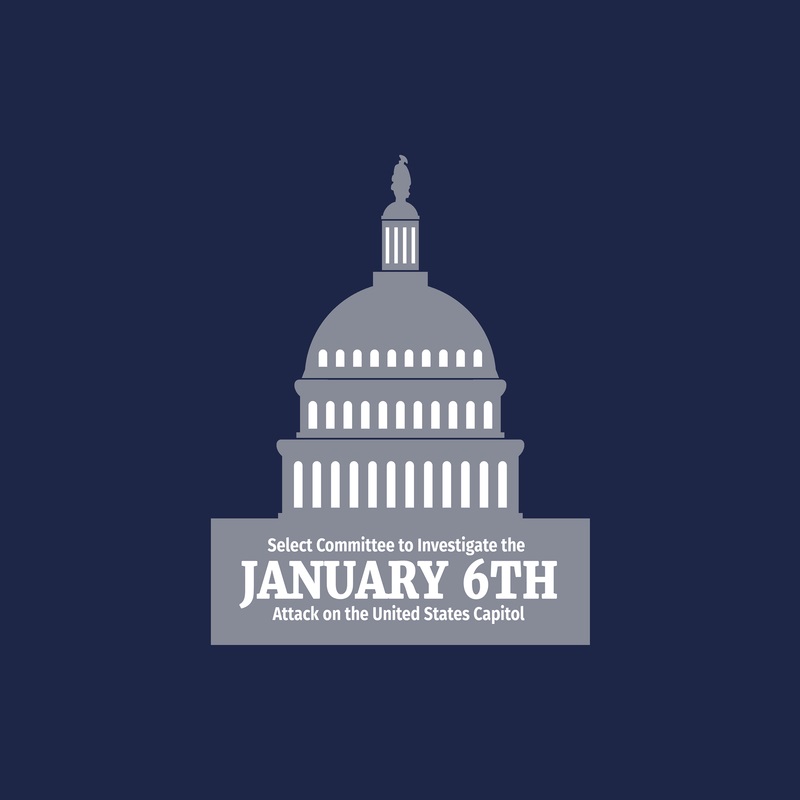
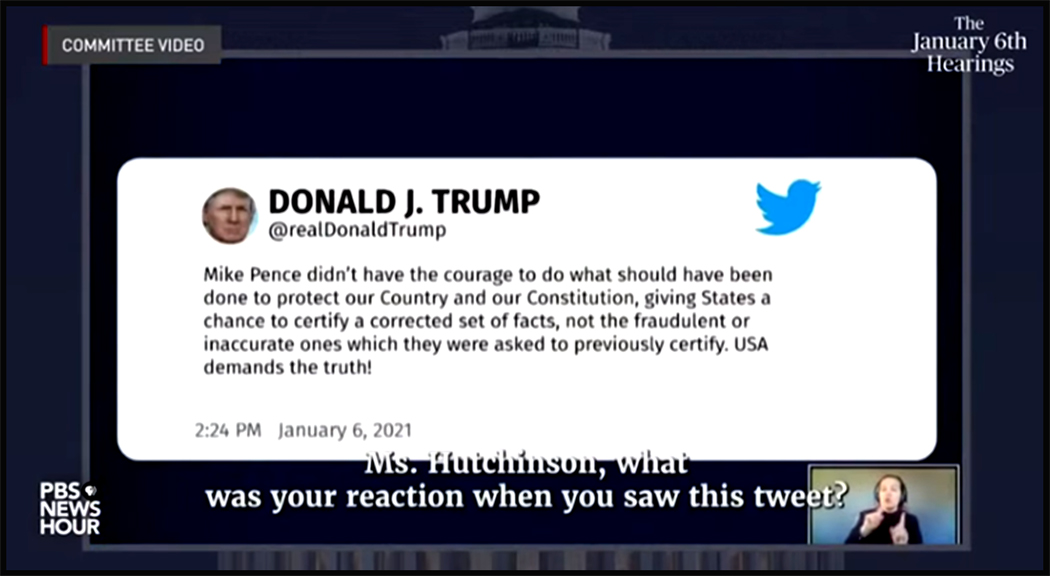
Leave a Reply